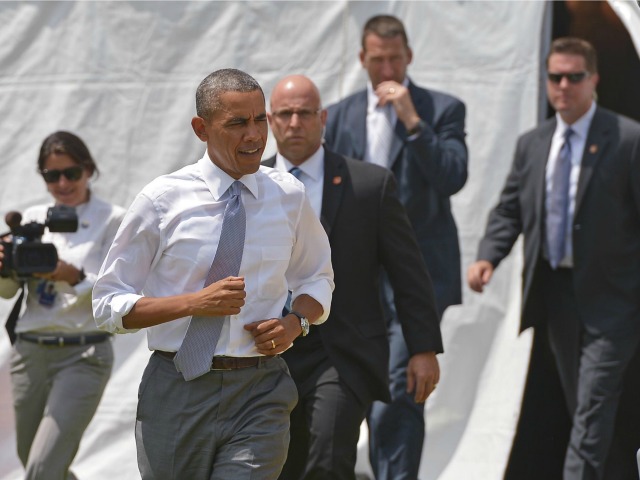Three weeks ago, President Obama promised that the United States “will not be sending U.S. troops back into combat” in Iraq. But Foreign Policy magazine (FP) just reported that Chairman of the Joint Chiefs of Staff General Martin Dempsey acknowledged that the United States is not only considering airstrikes in Iraq against the Islamic State of Iraq and al-Sham (ISIS), but for the first time is talking about taking “direct action.” This is Pentagon “speak” for sending in American Special Forces or Special Operations units for combat missions. President Obama’s “mission creep” in Iraq appears to be quickly morphing into a “mission run.”
With the growing belief that the Iraqi army cannot retake the territory ISIS seized without help, at a July 3rd Pentagon briefing, General Martin Dempsey said, “Assessing and advising and enabling are very different words than attacking, defeating, and disrupting.” He also said, concerning the current U.S. role in Iraq, “We may get to that point if our national interests drive us there, if [ISIS] becomes such a threat to the homeland that the President of the United States with our advice decides that we have to take direct action.”
His comments came after ISIS leader Abu Bakr al-Baghdadi declared a new Caliphate called the “Islamic State” across Syria and Iraq and himself Caliph on June 29th. “We have had all the requirements of the Islamic state like fundraising, almsgiving, penalties, and prayers and still have only one thing which is the Caliphate,” said the Caliph’s spokesman Abu Mohammed al-Adnani. “The legality of all emirates, groups, states, and organizations, becomes null by the expansion of the Caliph’s authority and arrival of its troops to their areas.”
The statement had a big impact on U.S. friends in the region, Saudi Arabia and Jordan. The Kingdom of Saudi Arabia quickly deployed 30,000 of its troops to the Iraqi border to prevent the Islamic State from deciding to take Saudi oil fields. Jordan knows that its “special relationship” with both the United States and Israel means their friends would be forced to intensely intervene if the nation is attacked by the Islamic State.
Defense Secretary Chuck Hagel admitted at the Pentagon briefing that that U.S. has approximately 800 troops in Iraq, including 100 that predate the unfolding crisis there and about 700 who have been sent to help protect U.S. personnel and assist the Iraq army on the deteriorating security conditions.
The Washington Post has also reported that the Central Intelligence Agency has maintained a large clandestine presence in Iraq “as part of a plan by the Obama administration to rely on a combination of spies and Special Operations forces to protect U.S. interests in what was thought to be a former war zone.
General Dempsey said that the United States has a much better intelligence picture than it did two weeks ago, but the intermingling of Sunnis who oppose the current Shiite-dominated government of Nouri al-Maliki and the Islamic State extremists pose a difficult challenge if the U.S. decided to rely solely on airstrikes to assist Iraqi forces.
The FP reported that six U.S. “assessment teams are now on the ground to develop a clearer picture of the state of the Iraqi security forces and the strength of the ISIS extremists.” Dempsey said the initial reports from those teams are not encouraging. Iraqi security forces seem to be “stiffening” and appear capable of defending Baghdad, but Dempsey does not believe they can retake the northwest and the cities of Fallujah, Ramadi, and Mosul that the Islamic State militants have overrun.
“Will the Iraqis at some point be able to go back on the offensive to recapture the part of Iraq that they’ve lost? … Probably not by themselves,” Dempsey asserted.
Dempsey described the threat posed by Islamic State today as a regional one, but he said it could become “transregional” or global over time. He said this does not mean the U.S. would contribute direct military support to help. But for the first time, Dempsey said the Pentagon would not rule out the option of ground troops.
Dempsey added that before the United States determines what offensive role, if any, it would play in Iraq, the Obama administration wants the Iraqi government to be a reliable U.S. partner in rehabilitating relationships by forming a unity government between Iraq’s embittered Sunni and Kurdish minorities.
President Barack Obama declared the equivalent of “Mission Accomplished” on October 21, 2011, when he announced that he was pulling out the last 40,000 U.S. troops from Iraq by the end of the year. “After nearly nine years, America’s war in Iraq will be over,” Obama told reporters. But it now appears that President Obama’s creeping new mission in Iraq is about to go into a full run.
The author welcomes feedback and will respond to reader comments.
From July 15th to July 29th, Chriss Street will be teaching “Entrepreneurship and Capitalist Business Strategy” at Ho Chi Mihn University in Vietnam.

COMMENTS
Please let us know if you're having issues with commenting.